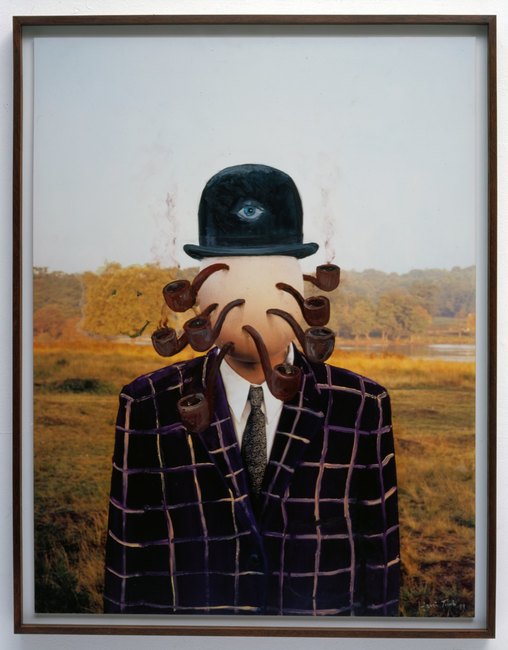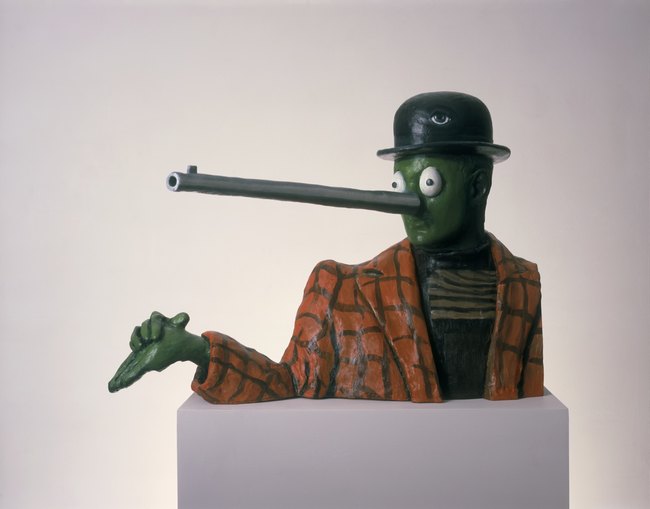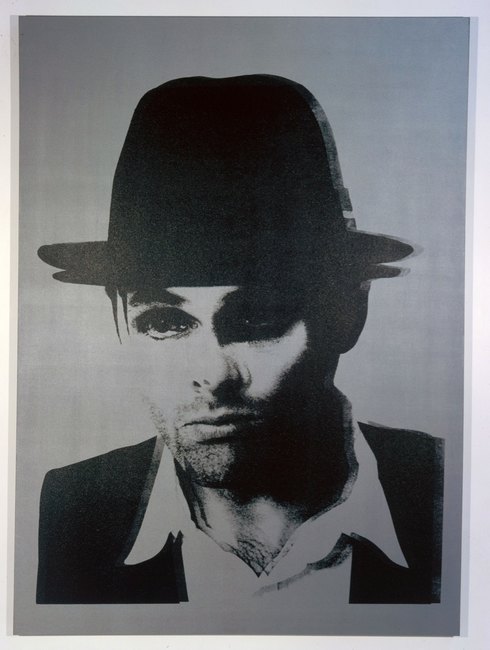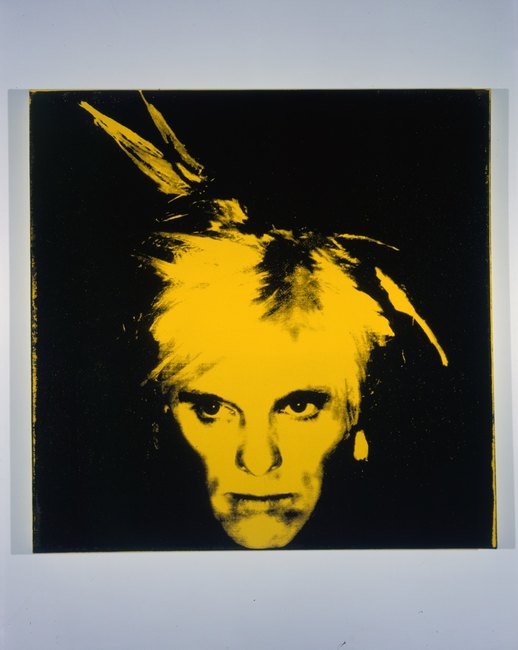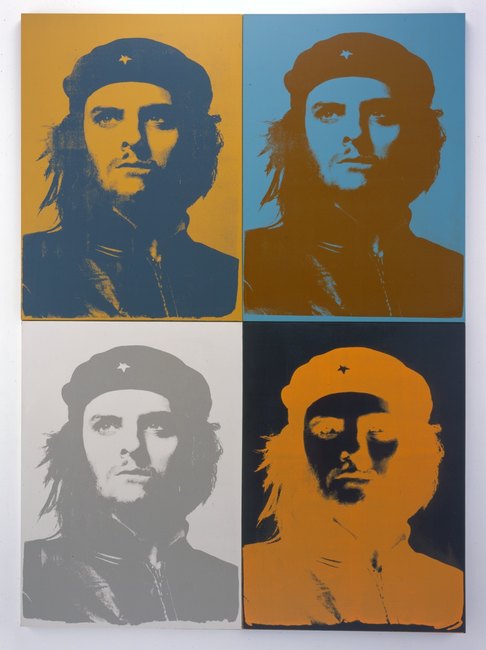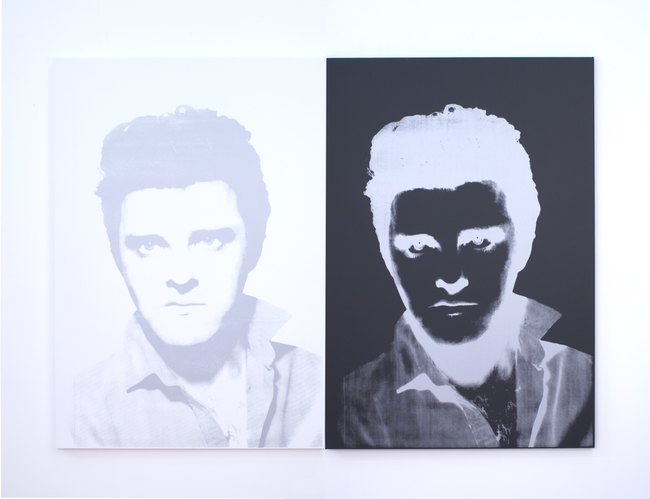AboutEssays2005Gavin Turk Is Not A Common Thief
Some people think he is, but I disagree. I think he’s more like Hans Gruber, the German terrorist who takes over Nakatomi Towers in Die Hard.
Let me explain.
Mr. Turk is certainly a copycat. This is a well known fact, and indeed, a reason people are drawn to his work. The way he deals with concepts such as authorship and originality resonate with us, and for good reason.
Most of us are common thieves.
Every day each of us break copyright laws many times, without even realizing. If you photocopy a page from a book, take a picture of a work of art you didn’t produce, sing ‘Happy Birthday’ in public or forward an email you didn’t write, you’re guilty.
Our ideas about property rights, intellectual or otherwise, are generally viewed as good for society. Most of the time, they are. The problem is our laws pertaining to intellectual property are no longer sophisticated enough to deal with the ways we use information in the real world.
A law professor named John Tehranian from The University of Utah recently conducted an experiment that proves this. He made a note of every time he inadvertently broke copyright law and then worked out how much he would owe if he was sued each time this happened. He calculated that he would owe an average of $12.45 million a day. If we take Tehranian to be an average law abiding citizen, then the average law-abiding citizen is currently ringing up $4.5 billion a year in copyright violations.
Of course, the majority of us don’t get sued for these heinous crimes we commit daily, because these laws are ridiculous and unworkable, and most acts of copyright infringement are entirely harmless. The crimes are ignored and we go unpunished. But we’re still common thieves on paper. This huge crevasse between law and reality appeared because two things happened.
First our technology changed. When these laws were written, information used to flow in one direction. Producers produced, consumers consumed. There was a clear line between broadcaster and receiver, artist and fan, creator and pirate. But today that line is just a blur. Information now moves in many directions at once. Anybody can produce, rebroadcast or remix information of all kinds. Consumers can talk back in a variety of ways. They can form angry mobs or fan clubs - the fate of producers is in their hands. There is a power shift going on.
Secondly, all this new technology amplified one of our oldest behavioural traits; copying. Copying is part of the human condition. It is the backbone of our culture. It is how we learn to talk. It is how we learn social norms and manners. We are, all of us, relentless copying machines. And now we have access to the internet, the most advanced copying machine we’ve ever created.
The big problem is that our laws are not written with the behaviour of billions of human copying machines in mind. We common thieves don’t spend large amounts of time and money coercing governments to make sure copyright laws suit our behaviour. But large multinational media companies do. The result is a set of rules that serve their needs, but don’t work quite as well for everyone else.
But the lot of the common thief is worth defending. Families shouldn’t be receiving takedown notices from record labels for posting home movies up on YouTube of their kids dancing to copyright protected music. Companies shouldn’t be able to use copyright law to stifle free speech and stop information that makes them look bad from reaching the general public. Entertainment conglomerates shouldn’t be allowed to upload damaging spyware onto your computer without asking you, just to make sure you’re not stealing any of their content. Telecoms companies should not be given the power to decide what information you do and don’t see online. If the disconnect between law and reality is not addressed, our freedoms will be eroded.
It takes a different kind of thief to defend such freedoms. It takes artists like Turk publicly questioning who owns what. We need pirates that speak truth to power in order for things to change. Without the outcast at the outer marker moving the boundaries, everything stagnates. Ideas capable of making society better, fairer or more democratic are always resisted by those with a vested interest in maintaining the status quo. We need people who innovate without asking permission.
Some of the greatest innovators in history were thought of as common thieves when they started out. When Thomas Edison invented the phonographic record player, musicians branded him a pirate out to steal their work and destroy the live music business, until a system was worked out so everyone could be paid royalties. We now call this system the recording industry.
Edison went on to invent film making, and wanted to charge a license fee to every film maker using his invention. Several New York film makers, including a young man named William, disagreed with this policy, and fled to the then still Wild West coast where they could make films illegally away from Edison’s team of lawyers, and flee to nearby Mexico if said lawyers were dispatched. This town of pirate filmmakers is still there today, it’s called Hollywood. William’s second name was Fox.
Today these industrial monoliths established by pirates are locked in fierce battles with us common thieves to protect their intellectual property rights. But when throwing lawsuits at your fans suddenly becomes an important part of your business model, you no longer have a business model.
When information flowed in one direction, it was easy to take culture and attach it to a product in order to sell it. Those on the edges of society created meaning, and then the commercial world stole it. But now the outsiders are finding ways to take meaning back from the market. People are organizing without organizations. Loose-knit networks and open source structures are proving to be more effective at doing some things than governments and markets. As a result we’re rebelling in new ways. Warhol famously said that “good business is the best art.” Culture used to be one of the only ways of rebelling in a non-violent manner, but today we can kill bad ideas with new business models.
It already seems like bad ideas and old power structures are being brought to the slaughter on a daily basis, and the revolution hasn’t even started yet. The future promises even more unfettered access to information and intellectual property. In May of 2008, a Professor named Adrian Bowyer at the University of Bath created the world’s first 3-D printing machine that can print out a copy of itself. The internet may be the world’s ultimate copying machine at the moment, but that was just Act One.
Act Two promises even greater levels of conflict. The war over intellectual property is going to get weird. But this movie has a happy ending. The truth is this new reality is good news for creators and copyright holders large and small - it’s just taking a while to figure out the details.
The future promises unlimited opportunities to create, reach audiences, gain notoriety, earn money and all the rest of it, if we can only reconcile the two conflicting forces at work when we have a new idea. At the same time as we are thinking “how can I get this out there?” we’re also asking ourselves “how can I benefit from/monetize this idea?” We want to spread ideas as information, but capitalize on them as intellectual property.
Which brings me to Die Hard.
Just before 20th Century Fox released the fourth Die Hard film in 2007, the marketing team at Fox had only one question: How do we get people excited about the Die Hard films again online?
They didn’t know a comedy rock band named Guyz Nite had just uploaded their new video for their song entitled Die Hard, to YouTube. The verses of the song outlined the plots of the first three Die Hard set to a sequence of tightly edited clips from the movies. It was hilarious enough for millions of people to watch it and tell their friends about it.
The legal team at Fox found out about the copyright violating video. They did their jobs, and asked YouTube to take down the infringing material. And YouTube did. End of story.
Except it wasn’t. When the marketing team at Fox found out about the video, and the millions of people getting excited about the Die Hard franchise again because of it, they called Guyz Nite. They had only one question: How much do we have to pay you to put that video you made up on YouTube?
It all worked out in the end – copyright laws were ignored in favour of user-generated content that helped everybody out. The band even got an invite to the New York premiere of the film. Pirates can reach the places other advertisers cannot reach. It’s like Jean-Luc Godard said: “It’s not where you take things from – it’s where you take them to.”
This period of corporate cognitive dissonance we are experiencing will continue for some time. But unreasonable and outdated notions about intellectual property will eventually become history, if enough of us strive to be more than just common thieves.
Towards the end of Die Hard, Holly McClane says to Hans Gruber, “After all your posturing, all your speeches...you're nothing but a common thief.”
Hans replies, “I'm an exceptional thief, Mrs. McClane.”


